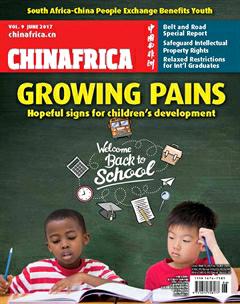Briefs
Cutting Excess Capacity China will continue phasing out substandard production capacity, especially in fields of steel, iron, coal mining and coal-fired power plants, to keep up with targets set for the year. The decision was made at a State Council executive meeting, which was presided over by Premier Li Keqiang on May 10. The meeting decided to adopt more methods based on market rules and related laws while phasing out outdated capacities. It also decided to shut down illegal production facilities and prevent them from restarting again. By the end of June, all facilities producing inferiorquality steel bars will be dismantled. All coal mines scheduled to close this year will stop production by the end of August and will be phased out by the end of November.
Boost for Recycling Industry Chinese authorities released an action plan to boost the recycling industry amid government efforts to promote green and sustainable growth. By 2020, China aims to increase the output value of the resource recycling industry to $434.8 billion, a jump of 67 percent from that of 2015, according to the plan jointly released by 14 agencies including the top economic planner and environmental watchdog. The resource productivity ratio should rise by 15 percent from the 2015 level, and the recycling utilization ratio of major waste should reach 54.6 percent by 2020, said the plan. Through the efforts, China hopes to foster a green, low-carbon development model to encourage green lifestyles and green consumption among the public.
Growing Bilateral Trade Trade volume between China and African countries surged 16.8 percent year on year in the first quarter of 2017 to $38.8 billion as bilateral economic relations boomed, Chinas Ministry of Commerce said on May 11. This was the first quarterly rebound in bilateral trade between China and Africa since 2015, with Chinese imports from Africa up 46 percent to $18.4 billion, Sun Jiwen, Spokesperson for the Ministry of Commerce, told a press conference. Chinese exports to Africa declined 1 percent year on year to$20.5 billion in the first three months of this year, compared with an 18 percent drop in the same period last year, he said. Sun attributed the growth to the implementation of 10 major China-Africa cooperation plans proposed at the Johannesburg Summit of the Forum on China-Africa Cooperation in 2015, which included interest-free loans and preferential policies.
More Jobs Created Chinas quarterly job report delivered a positive message as 3.34 million new jobs were created and the unemployment rate fell to 3.97 percent in the first quarter of 2017. The number of new jobs was 160,000 higher than that in the same period last year, official data showed. “Chinas job market posted a strong start this year and remained stable in the first quarter,” said Lu Aihong, Spokesperson of the Ministry of Human Resources and Social Security, at a press conference. Economists said the lower jobless rate suggested a healthier picture of the Chinese economy. “The need for workers is particularly pressing in the manufacturing sector,” said Zhang Yizhen, Vice Minister of Human Resources and Social Security.
Improving SOEs Management Chinas State Council released a guideline on corporate governance structure at state-owned enterprises (SOEs) on May 3.
The guideline clarified relations between investors, the board of directors, managers and the board of supervisors at state firms, with detailed clarifications of their obligations and responsibilities. Corporate articles should play a basic role in management of the firms to regulate the activities of different bodies, the guideline stressed. Although most state firms already have established corporate systems, problems such as unclear responsibilities and lack of checks and balances still exist, the State Council noted. China hopes to boost the efficiency of SOEs, make them operate in accordance with market rules and assume responsibility for their own profits, losses and risks, according to the guideline, which set a goal of basically completing the reforms by the end of 2017.
Standardizing Business Charges China will standardize business charges to clarify and lower business costs, Chinas top economic planner announced on May 5. Improper service charges on companies will be canceled while those which are unreasonably high will be lowered, according to a statement released by the National Development and Reform Commission. Specifically, brokerage businesses should not take advantage of government influence to make charges. Industry associations should not make mandatory charges. By the end of August, Chinas central authorities will conduct random checks on business charges, the statement said. China has made significant progress on cutting administrative charges and reducing corporate burdens. Since 2013, central and local authorities have eliminated more than 1,000 unnecessary administrative fees.

